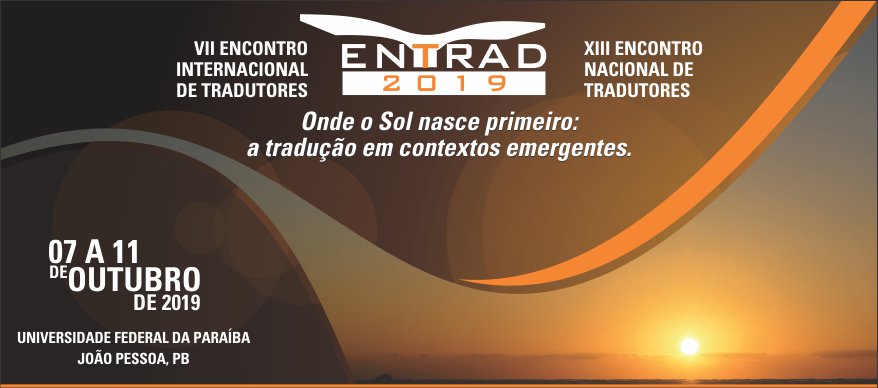Antes de se inscrever, leia as orientações AQUI
Práticas e didáticas de interpretação e de mediações linguístico-culturais
Didactics and Practical Experiences in Interpreting and Cultural Mediations
Anelise Freitas Pereira Gondar
UERJ
anelisegondar@gmail.com
http://lattes.cnpq.br/9885913232311539
Tito Lívio Cruz Romão
UFC
cruzromao@terra.com.br
http://lattes.cnpq.br/7110160857332053
Idiomas de trabalho | Work languages: Português, English, Español
Resumo: A arte e ofício da comunicação intercultural, presente desde tempos imemoriais (Pöchhacker, 2007) nas mais diversas interações entre povos e culturas, tem voltado ao centro das atenções de algumas pesquisas no âmbito do Ensino de Línguas Estrangeiras (LE) e dos Estudos da Interpretação. No Brasil, conquanto contemos com experiências consolidadas de ensino da interpretação de línguas orais em universidades e cursos comerciais, desafios persistem quanto à inserção do debate em IES federais e estaduais, quanto à interface entre interpretação, mediação linguística e non-professional translation. Nas últimas décadas, a mediação linguístico-cultural envolvendo línguas orais e, mais recentemente, línguas de sinais – tanto em contextos profissionais quanto em redes informais de solidariedade, como as mediações na interação com refugiados, pacientes estrangeiros em hospitais etc. – constituiu-se como campo de pesquisa que impõe desafios de ordem teórica, metodológica e prática a professores, formadores de mediadores/intérpretes e practitioners em geral. Este ST busca reunir trabalhos que abordem e discutam desafios e possibilidades de atividades de interpretação (formais ou informais) de línguas orais e línguas de sinais, além de mediações linguístico-culturais vivenciadas no Brasil. Contribuições de professores de LE, intérpretes e mediadores são bem-vindas, bem como a apresentação de experiências, estudos de caso e reflexões sobre o presente e futuro da mediação e da interpretação no Brasil. Com isso, os objetivos gerais do ST são: a) discutir a relevância da pesquisa em interpretação e mediação no contexto brasileiro; b) debater experiências de interpretação de/para idiomas orais raros e de sinais; e c) abordar interfaces com a ideia de mediação linguística e cultural conforme o Quadro Comum de Referência para Línguas Estrangeiras. Dentre os objetivos específicos estão: a) discutir práticas pedagógicas em interpretação, mediação e non-professional translation em experiências na graduação, extensão e pós-graduação e b) fomentar o diálogo entre estas experiências e a recente evolução da atividade interpretativa em línguas de sinais. Os trabalhos poderão ser apresentados em português, inglês ou espanhol.
Palavras-chave: Estudos da Interpretação, Mediação linguístico-cultural, Didáticas da interpretação e mediação
Abstract: The arts and crafts of intercultural communication has been part of the human experience since immemorial times (Pöchhacker, 2007) enabling relationships between peoples and cultures – this phenomenon has been at the heart of research projects in areas such Foreign Language (FL) research and Interpreting Studies. In Brazil, while we look back to consolidated teaching experiences in the areas of spoken and sign languages be it in universities or in commercial courses, challenges persist regarding possibilities of broadening the debate in order to include federal and state (public) higher education institutions in matters such as interpreting, cultural mediation and what came to be known as non-professional translation. Over the last few decades, linguistic and cultural mediation involving spoken and more recently also sign languages – in official settings and informal solidarity networks such as with/among refugees and in hospitals – unveiling new aspects regarding theories, methodologies and practices with direct influence upon interpreters’ trainers, FL teachers and practitioners. The aim of this symposium is to gather presentations that point out the challenges and possibilities of spoken or signed interpreting activities (in official and/or informal settings) and also experiences of cultural mediation in Brazil. Contributions of FL teachers, interpreters and mediators are welcome as well as presentations that aim at shedding light upon individual mediation experiences, case studies and thoughts on the present situation and future prospects of mediation and interpreting in Brazil. Thus, the overall objectives of the symposium are: a) to discuss the relevance of interpreting and mediation research in the Brazilian setting; b) to share experiences on interpreting to/from ‘rare’ spoken languages and sign languages; and c) engage in the debate on points of intersection between cultural mediation as understood in the context of ‘Interpreting Studies’ and the Common European Framework of Reference for Languages (CEFR). Other interests are a) to discuss teaching practices in interpreting, mediation and non-professional translation at undergraduate and graduate levels and b) foster the dialogue considering the above mentioned and experiences and the recent evolution of sign languages interpreting and practices. We welcome presentations in portuguese, english and spanish.
Keywords: Interpreting Studies, Cultural Mediation, Didactics
Antes de se inscrever, leia as orientações AQUI
